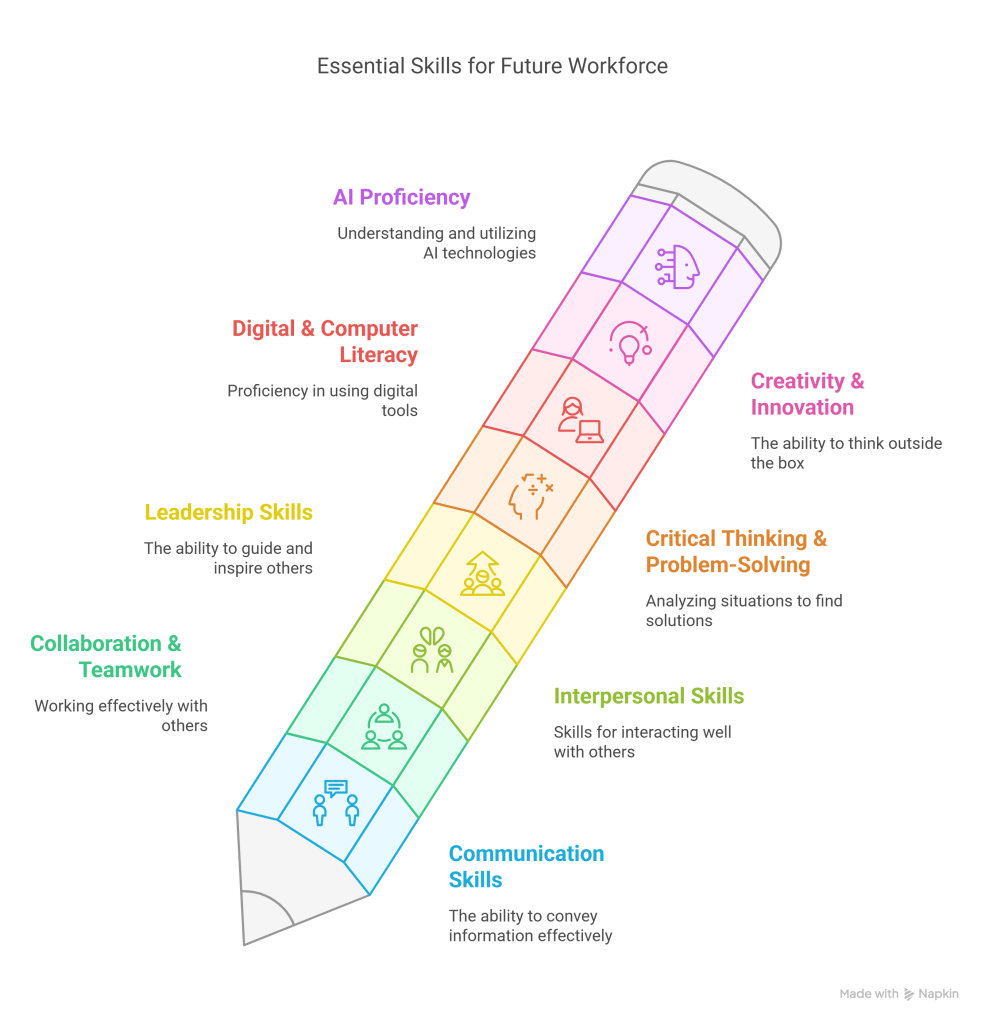Key Skills Employers Look for When Hiring in 2025
In today’s rapidly evolving job market, technological advancements, shifting work models, and changing industry demands are redefining the skills employers prioritize.
By 2025, standing out in the competitive hiring landscape will require more than just degrees or traditional qualifications. Employers now seek candidates with a mix of technical proficiency, soft skills, and adaptability to drive business growth.
Whether you’re a fresher or an experienced professional, mastering in-demand skills will give you a competitive edge.
In this blog, we explore the top skills employers will prioritize in 2025 and how you can develop them.
Top 10 Skills Employers Will Look for in 2025

While job-specific expertise remains important, certain universal skills will make candidates stand out. Here are the key competencies employers will seek:
1. Communication Skills
Effective communication is essential in any workplace. Employers value professionals who can articulate ideas clearly, actively listen, and adapt their communication style to different audiences.
Strong communication skills—whether written, verbal, or negotiation-based—ensure seamless collaboration and productivity.
How to develop:
- Practice public speaking and business writing.
- Enroll in professional communication and presentation courses.
2. Collaboration & Teamwork
Modern workplaces thrive on teamwork, with cross-functional teams working toward shared goals. Employers seek candidates who can collaborate effectively, respect diverse perspectives, and contribute to a positive work environment.
How to develop:
- Participate in team-based projects and group discussions.
- Improve active listening and engage in team-building activities.
3. Interpersonal Skills
Building strong relationships is critical for career success. Employers look for candidates who can navigate workplace dynamics, resolve conflicts, and interact professionally with colleagues and clients.
How to develop:
- Enhance verbal and non-verbal communication.
- Practice empathy and active listening.
4. Leadership Skills
Leadership isn’t just for managers—employers value professionals who take initiative, motivate teams, and drive projects forward. Strong leadership fosters better performance and organizational success.
How to develop:
- Seek mentorship opportunities.
- Take on leadership roles in projects or volunteer work.
5. Critical Thinking & Problem-Solving
In a fast-changing market, employers need employees who can analyze complex situations, identify challenges, and implement effective solutions.
How to develop:
- Engage in problem-solving exercises and case studies.
- Practice analytical thinking through real-world scenarios.
6. Digital & Computer Literacy
Nearly every job requires some level of digital proficiency. Employers look for candidates comfortable with software tools, data analysis, and basic troubleshooting.
How to develop:
- Master Microsoft Office, Google Suite, and industry-specific software.
- Stay updated on emerging workplace technologies.
7. Creativity & Innovation
As competition grows, companies seek employees who think outside the box. Creativity drives business growth, product development, and strategic problem-solving.
How to develop:
- Attend creative workshops or design-thinking courses.
- Explore diverse fields to gain fresh perspectives.
8. Artificial Intelligence (AI) Proficiency
AI is transforming industries, and professionals who understand its applications—such as prompt engineering—have a competitive edge. Employers value candidates who can integrate AI tools into workflows efficiently.
How to develop:
- Take online AI and machine learning courses.
- Experiment with tools like ChatGPT and automation platforms.
9. Adaptability
The ability to pivot in response to change is invaluable. Employers prioritize candidates who can learn quickly, embrace new roles, and thrive in evolving environments.
How to develop:
- Take on projects outside your comfort zone.
- Develop a growth mindset and stress-management techniques.
10. Emotional Intelligence (EQ)
EQ is now as crucial as technical skills. Employers seek professionals who manage emotions, understand team dynamics, and foster strong workplace relationships.
How to develop:
- Practice mindfulness and self-awareness.
- Take EQ-focused courses or read leadership books.
Stay updated on career opportunities:
Conclusion
The job market in 2025 will demand a blend of technical expertise, soft skills, and adaptability. Employers are shifting focus from academic credentials to problem-solving, digital literacy, leadership, and emotional intelligence. By honing these skills, you’ll position yourself as a top candidate in any industry.
FAQs
1. Will AI replace human jobs?
While AI is reshaping roles, it also creates new opportunities. Professionals who leverage AI tools will have a competitive advantage.
2. How can I improve my communication skills?
Practice active listening, engage in public speaking, and take professional communication courses.
3. How do I showcase these skills on my resume?
Highlight relevant skills in your experience section, include certifications, and provide concrete examples of how you’ve applied them.










